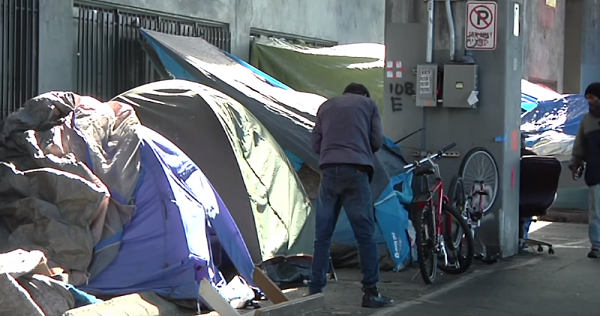
Other than the existence of the burgeoning tech and aviation markets, the cottage industry of socialized vagrancy has been upgraded to a swanky McMansion business venture by a multitude of pitiful factors, including an inept city council, skyrocketing housing prices and the prevalence of rampart enablement, transforming Seattle neighborhoods into living nightmares, and residents would gladly welcome a zombie apocalypse to squelch.
The tip of the ominous iceberg was first revealed with the painful undertaking of Amy Schumer’s attempt at the elusive concept of humor. In March of this year the superior court judge inexplicably ruled that vehicles could legally be deemed a primary residence based on the original homesteading policy of the state drafted in the 19th century. The fallout of course, was almost immediately represented by an epic caravan of decrepit campers, vans, and automobiles seeking refuge in the city’s residential neighborhoods, and the opportunity to establish a claim abutting the sidewalk space directly in front of a family’s home, without any fear of parking tickets or an impound. With the existence of a heavy and unreasonable gun tax and a culture wary of self-defense against newly arriving shady characters, property owners should simply yield to the unfettered trade winds of progressive policy in opening up their hearts and yards to people who have an aversion to the idea of paying rent. Ahhh, the wonders of the American dream.
The Seattle Times reports that the government manufactured homeless paradise has reached such a level of chaos that the Ballard neighborhood, a once thriving working class extension of the city harboring the majority of the local fishing community, is now completely overrun with tents, garbage, drug needles and even human detritus. Residents have run out of patience as they watch their streets degrade to a Venezuelan level of hopelessness, sparked by incompetency and corruption. This is the same Ballard featured in a Liberty Park Press story, which highlights the questionable ethics of city council member Mike O’Briens’ subversive attempt to force waterfront businesses to close in favor of high rent apartment multi-use complexes, by lobbying for a $12 million per mile bike lane, or “Mike Lane.” O’Brien, of course, is knee deep in the disturbing reality that homelessness in his district grew by a magnitude of FOUR last year.
Incomplete Timeline of Seattle’s Highway To Hell
2001- Boeing relocates corporate headquarters to Chicago
2008- The city loses the Seattle Sonics NBA franchise to Oklahoma City
2015- Former Mayor Ed Murray (resigned from office due to allegations of sexual assault on minors) declares a “state of emergency” over homelessness
2016- Seattle City Council votes to enact a tax on firearms and ammunition
2017- Seattle City Council lays the groundwork for public illegal drug injection sites
2018- Superior Court judge rules that vehicles can be defined as homes
2018- Seattle City Council approves and then repeals corporate head tax to fund homelessness
Apparently, cities in the West that do not have a Seattle or San Francisco open arm approach to vagrancy, are actually offering one-way bus tickets to the Northwest to aggressively fighting their own issues. Just send ’em where people are nice has become the modus operandi. As the political makeup of Seattle is predominately left-leaning, the city has a reputation for being a haven for misplaced compassion and of course enablement, and the trickle down effect of human musical chairs resounds in a northerly flow up the coast in predictable migratory patterns contingent on weather conditions.
In May of this year the cauldron of frustration boiled over as Seattle Mayor Jenny Durkan attempted to impose a corporate head tax on larger businesses, with the proceeds allocated to combat the homeless issue in the form of millions of dollars purchasing God knows what. After the city council voted to enact the tax, there was an immediate backlash from the local business community and citizens, and the plan was eventually repealed, as Amazon officials leaked that the online retail giant was aggressively scouting new locations for corporate headquarters. At least a few of the elected officials had the sense to see the pratfalls of a potential mass loss in tax revenue, with the Boeing decision to move central operations to Chicago in 2001 as a clear and loud precedent.
While many homeless advocates point to the region’s flourishing real estate market influenced by a growing number of highly paid techies filling cubicles at Amazon, Google and Microsoft as the main culprit in creating an affordable housing shortage, what the pundits fail to mention is that the average yearly for a city of Seattle full-time employee is over $100 thousand per year. In a sense, the local government has furnished a vast elite group of bureaucrats, who wine and dine directly from the money of hard working residents. The biting irony is the city also managed to approve a $15 mandatory minimum wage, which along with the hordes of panhandlers targeting tourists in the downtown corridor surrounding the iconic Pike Place Market, and limited parking options, has virtually devastated the service industry. Viewing the entire flawed economic snapshot, the middle class is literally being taxed to oblivion and caught between the hypocrisy of socialist policies and the insidious presence of inflation, with pressure constantly applied from all sides in a volatile mixture comprised of overcompensated civic servants and a swarm of individuals addicted to the boundless benefits of the nanny state. The question remains, which group is more fiscally valuable to the city council in the long run, the middle class or a perpetual homeless epidemic?
The local media has fallen in love with the term “homeless crises” as a reckless misnomer encapsulating an environment spawned by the social engineers of local government and a complete lack of accountability and transparency for hundreds of millions of dollars earmarked for ambiguity and virtually untraceable within the daunting maze of infrastructure.
In order to balance the relative inanity of the mainstream press (Seattle radio talk show hosts Dori Monson, Jason Rantz, and Todd Herman are quite proactive in taking the city council to task. Even the nationally syndicated Michael Medved, who lives in the area, will periodically address the issue on his nationwide program.) a group of local activists have employed social networking as a platform in sharing content and keeping tabs on the diminishing quality of life throughout Seattle’s neighborhoods. However, the unrealistic task of tracking the exact allocation and effectiveness of public monies is impossible and the tactics of obfuscation orchestrated by politicians, turns an unpalatable situation into the repugnant.
Another drop in the bucket.
There are even various rumors swirling around that the city council actually dreamed up the idea of a national recruiting campaign for vagrants at an LGBT sensitivity conference in Tahiti, as a linear revenue source for alleviating budget shortfalls caused by the crushing weight of an unsustainable and exponentially increasing pension plan. The oldest trick in the book, deflect and deny.
Suffice to say, a small proportion of the current homeless population struggles with mental and physical disabilities requiring supervision and the presence of health care professionals. The issue is that these people need to be taken off the streets and put into a controlled environment, which buffers the detrimental chaos, and provides an opportunity for a quality of life. Unfortunately, in a free society, the debate is extremely precarious about how to justify forcing an individual into a livable situation, and at the same time honoring their constitutional freedoms. In many of these dire cases, the individual is beyond help, as the current state of the medical field does not offer viable treatments. While at least a few members of the Seattle City Council qualify for an obligatory mental health evaluation, one of the most eloquent and short-term solutions for residents is to vote them out, or park a derelict van or two nuzzled against the politician’s stretch of sidewalk and administered by a belligerently listless car camping uncle with a fear of modesty.
Then again, turnabout is fair play when city leaders allow a prevalence of illegal and unsanitary behavior in attempting to fix the accounting books. What is $100 million next to a stolen bike, a few scattered needles, a pile of fertilizer, and a riveting blue tarp shanty gently framing the evergreen canopy and vivid skyline of the Emerald City?
Read the Seattle Times story here.
